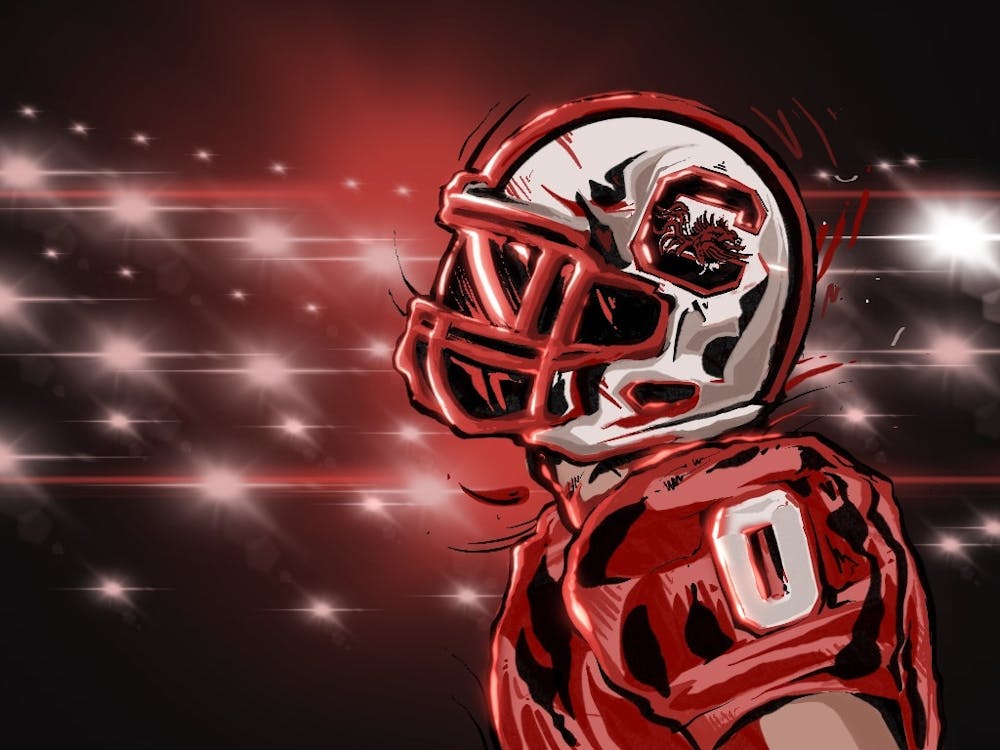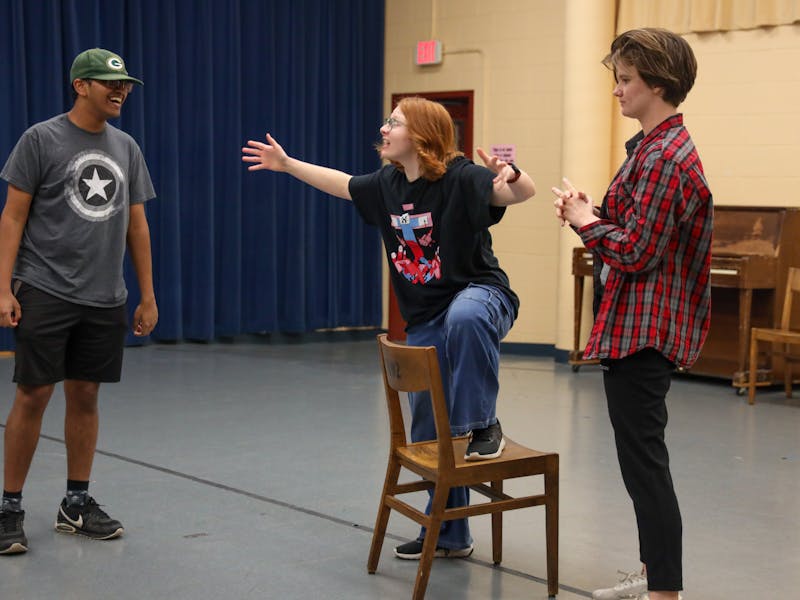It’s a crisp fall morning in Columbia. The leaves are just beginning to turn, and the smell of barbecue wafts through the air. The city is buzzing—roads are blocked, shuttles flood the streets, and crowds of people decked out in garnet and black march through. Anyone could sense that something is different about this day; there’s a feeling in the air, something age-old yet brand new, that sets it apart from the usual routine. It’s a Saturday in South Carolina, and on this particular Saturday, all roads lead to Williams-Brice Stadium. It’s game day.
Athletics are an incredibly central part of student life at USC. The buzz around a home football game extends beyond that singular Saturday, becoming a topic of conversation for sometimes weeks prior. It’s a ritual of sort, picking out your garnet and black attire, tailgating and gathering with friends and family. Though the game remains the focal point, the day becomes about community, about tradition. There are many ways that athletics at USC can draw us together as a student body, and unite us under a Carolina sky.
However, the strong culture around athletics at USC begs the question: are there moments when sports begin to overshadow other important aspects of student life? What happens when young athletes end up in the brightest spotlight—watched ever-closely by a fanbase that extends beyond the student body, through the state, and even across the country?
Through the decades, we have seen examples of instances where the culture fostered by collegiate athletic programs allowed athletes to avoid the consequences of their actions. At schools like Baylor University and Penn State, athletics very quickly transitioned from a point of celebration to an excuse for bad behavior. Baylor University was found guilty of Title IX violations between 2011 and 2015, when lawsuits alleged that sexual assaults by members of the football team occurred as a direct result of head coach Art Briles' emphasis on winning above all else—even ethics. One of these lawsuits made the claim that Briles fostered a culture that used sex to sell the program to future recruits by arranging to have these underage prospective players escorted to strip clubs, as well as arranging for women to have sex with them.
At Penn State University, another scandal displayed how coaches too can use emphasis on athletics as an excuse for poor behavior. After defensive coordinator Jerry Sandusky was found guilty of sexual abuse towards underage victims, formerly legendary head coach Joe Paterno was fired by the university as well. The question arose: how much did Paterno know about Sandusky’s behavior? In the wake of the announcement to fire Paterno, students rioted. The "press conference" announcing the firing of both Penn State’s president as well as Joe Paterno left students asking another pressing question. It did not concern the future of the university left without a president, nor did it tackle the status of Sandusky’s victims, or questions about the case. Rather, the resounding query was, “Who’s going to coach the football team on Saturday?”
Here at USC, we have been blessed to avoid a grave scandal of this scale in recent years. However, our athletic department has still seen some questionable events of its own. On August 3, Ashlyn Watkins, a national champion and star forward for the USC women’s basketball team, was arrested on charges of assault and battery as well as kidnapping. The incident causing the arrest occurred on-campus at student housing. Watkins was suspended from play while awaiting her court appearance; however, her charges were dismissed on November 1, and she has since returned to activities with the team. Though Watkins completed pre-trial intervention and was cleared at the discretion of the prosecutor, the situation still raises questions of accountability in athletics.
There is no doubt that athletics, whether it be in Columbia or across the United States, play a huge part in our society and culture. Despite the many difficult stories that can arise from a culture so centered on sports, there are countless values that athletics can bring to the table as well. Dr. Kevin Hull, an associate journalism professor and sports media lead here at USC, offered some valuable insight into the benefits of collegiate athletics along with the greater implications of athletics in broader society today.
Hull noted that community is one of the most important ideals when it comes to being a sports fan and an athlete.
“On Saturday in Columbia, we're all Gamecocks fans," Hull said. "And when the women's basketball team wins the national championship, we all win the national championship. And so it becomes a societal 'we're all in this together' moment.” Sports certainly serve as a way to find common ground, at any level. Hull described how fans who may not normally agree upon much can find one thing to agree upon as supporters of the same team.
A similar phenomenon can occur here for students who partake in athletics. Aside from its Division I teams, USC also boasts an impressive variety of clubs as well as intramural sports, which can allow students to meet new people and stay active. Club sports offer opportunities to practice regularly, travel and compete against other universities without the full commitment of playing a collegiate sport. These club teams also allow students to find a community built upon the shared love of a sport, a community that can become integral for new or transfer students who are looking to build meaningful, long-lasting connections at USC. Intramurals serve a similar purpose, while also allowing students to try out unfamiliar sports. In this way, athletics can serve as a key method for students to find their home in South Carolina.
In terms of how athletics can positively impact academics, Hull shared the ways that an impressive athletic reputation can draw more students to a school like USC. He cited the "Flutie Effect” as a prime example of this. The phrase originated from a 1984 football game between Boston College and the University of Miami, in which the BC Eagles pulled off a come-from-behind victory in the final seconds of the game. The play to win it all? Quarterback Doug Flutie threw a 48-yard Hail Mary pass, which was caught to take the Eagles to a victory touchdown. In the two years following the game, applications to Boston College increased by 30 percent. Now, Flutie’s name remains tied to the phenomenon that describes how successful athletics can draw attention to academic institutions. "When you look at it that way, it makes sense that we need good sports teams," Hull said. "Because sports teams are part of why people come here. It's part of the student experience to go to football games on Saturdays.”
Hull also added that here, our women’s basketball team stands firm as an integral part of USC culture. Thanks to Title IX, collegiate athletics have become a space in which women’s sports can be celebrated alongside men’s sports. Title IX is an amendment instituted in 1971 that prohibits discrimination on the basis of sex in government-funded educational institutions; it also mandates that the offerings of men’s and women’s sports in colleges must be proportional to the ratio of male-to-female students in the institution’s student body. In a country where it was formerly taboo for women to participate in athletics, college has become a platform for women to prove that they are just as skilled on the court, on the field, or in any athletic arena.
When it comes to the well-being of student-athletes themselves, Hull described how the university ensures that academics are still prioritized. “I know here they place a very big emphasis on academics," Hull said. "[Student athletes] all have academic advisors, they check in on their students. If a professor has a problem, I know I can email the academic advisor and they're going to take care of it right away or pretty quickly. So, I know here, specifically, they take it very seriously.” Many of USC’s athletics teams have even been honored for their academic success. The Gamecocks baseball team received the ACBA Team Academic Excellence Award for the 2023--2024 school year, which honors baseball programs that post a 3.0 GPA or higher for the duration of the year.
Despite the huge focus on the importance of athletics here at USC, it is key that the university continues to ensure academics and athletics work in cooperation rather than opposition. Sports can provide so much value to schools like USC. However, if we as a society allow athletics to become centered more around celebrity than community, we run the risk of losing sight of the greatest life lessons that sports have to offer. The power of athletics truly extends into every aspect of life; whether you are a coach, a fan, a student or an athlete, sports have the ability to shape us as people and as communities.



